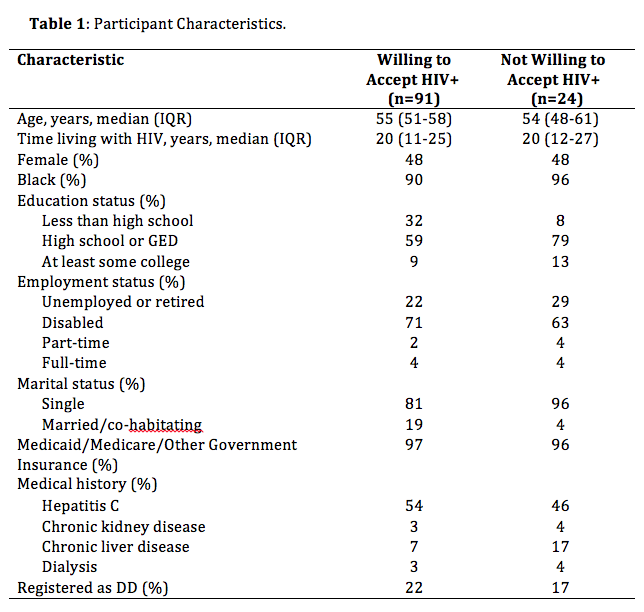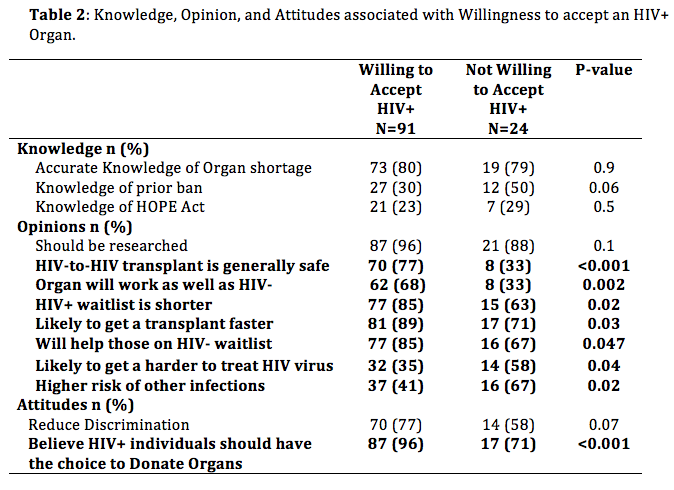Knowledge and Attitudes Associated with Willingness to Accept HIV+ Organs Among Persons Living with HIV.
Surgery, Johns Hopkins, Baltimore
Meeting: 2017 American Transplant Congress
Abstract number: 164
Keywords: HIV virus, Kidney transplantation, Kidney/liver transplantation
Session Information
Session Name: Concurrent Session: New Insights - HCV / HIV
Session Type: Concurrent Session
Date: Sunday, April 30, 2017
Session Time: 4:30pm-6:00pm
 Presentation Time: 5:30pm-5:42pm
Presentation Time: 5:30pm-5:42pm
Location: E271b
HIV-to-HIV organ transplants are a novel treatment for organ failure in HIV-positive (HIV+) individuals. However, attitudes of potential HIV+ recipients regarding HIV+ donors remain unknown.
Methods: We conducted a cross-sectional survey of HIV+ individuals using a convenience sample at our institution. We collected demographic and clinical information and knowledge and attitudes about HIV-to-HIV transplantation. Chi-squared tests were used to investigate associations with willingness-to-accept an HIV+ organ.
Results: Among 115 respondents, the median age was 55 (IQR 49-58), 52% were men, 91% were AA, and 97% had government insurance. Most (79%) respondents were willing to accept HIV+ organs (Table 1). Regarding potential risks, of those willing to accept an HIV+ organ, 77% believed that it would be safe (vs. 33% of those not willing), 68% that an HIV+ organ would work as well as an HIV-negative organ (vs. 33%), and 35% that they might get a resistant HIV infection (vs. 58%). Regarding potential benefits, 89% of those willing to accept an HIV+ organ believed they would receive an organ faster (vs. 71%), 85% believed this would help those on the general waitlist (vs. 67%), and 96% believed one should be able to donate to other HIV+ individuals (vs. 71%) (Table 2). There was no statistically significant trend between knowledge of the organ shortage and the HOPE Act with willingness-to-accept.
Conclusion: At our institution, the majority of HIV+ individuals were willing to accept HIV+ organs. Of those, almost half believed there would be some risks but believed that accepting an HIV+ organ would result in increased access to transplant and shorter waiting times, benefiting themselves and HIV- waitlist registrants.

CITATION INFORMATION: Anjum S, Halpern S, Kumar K, Nyugen A, Rasmussen S, Massie A, Tobian A, Segev D, Sugarman J, Durand C. Knowledge and Attitudes Associated with Willingness to Accept HIV+ Organs Among Persons Living with HIV. Am J Transplant. 2017;17 (suppl 3).
To cite this abstract in AMA style:
Anjum S, Halpern S, Kumar K, Nyugen A, Rasmussen S, Massie A, Tobian A, Segev D, Sugarman J, Durand C. Knowledge and Attitudes Associated with Willingness to Accept HIV+ Organs Among Persons Living with HIV. [abstract]. Am J Transplant. 2017; 17 (suppl 3). https://atcmeetingabstracts.com/abstract/knowledge-and-attitudes-associated-with-willingness-to-accept-hiv-organs-among-persons-living-with-hiv/. Accessed March 2, 2026.« Back to 2017 American Transplant Congress
